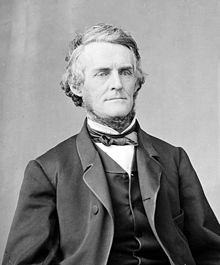William Dennison Junior
William Dennison junior (born November 23, 1815 in Cincinnati , Ohio , † June 15, 1882 in Columbus , Ohio) was an American politician . He was the 24th governor of the state of Ohio from 1860 to 1862 and US Secretary of State from 1864 to 1866.
Early years and political advancement
William Dennison attended Miami University until 1835 . After completing a law degree, he began working as a lawyer in Columbus. In addition to his legal work, he was also involved in the railway and banking business. He later became president of both a bank and a railroad company.
Dennison was originally a member of the Whigs , for whom he was also elected to the Ohio Senate in 1848 . In the national discussion on the question of slavery , he took a clear position against this institution. Consequently, after the collapse of the Whig Party, he joined the Republican Party, founded in 1854 . He campaigned for the abolition of the so-called "Black Laws" that discriminated against blacks in Ohio. This goal was achieved in 1849. In 1859, Dennison was elected the new governor of his country to succeed Salmon P. Chase .
Governor of ohio
Dennison took up his new office on January 9, 1860. The civil war began during his two-year term of office . The governor supported all war efforts of the federal government under President Lincoln . It exceeded the contingent of soldiers planned for Ohio. In total, more than 100,000 men were drafted into the army during his reign. Part of this army was sent to West Virginia under General George B. McClellan to protect the local federal population from Confederate attacks. He took care of the conversion of industrial production to armaments requirements and the establishment of several training camps for the army. Right at the beginning of the war he placed the railways and telegraph services under state supervision in order to make them usable for the military.
Domestically, he made a number of mistakes that cost him his re-election in 1862. Dealing with finances played a role in particular. However, it was not about personal abuse, but about procedural errors in the booking.
Member of the US Government
After the end of his governorship in January 1862, Dennison returned to practice as a lawyer. He also advised his successor in office, David Tod . In 1864, Dennison was chairman of the Republican Congress , where Abraham Lincoln was again nominated for their presidential nomination. Soon afterwards, Lincoln appointed him Postmaster General in his cabinet . He held this office until 1866. Then he resigned because of differences with the new President Andrew Johnson from this office.
In 1872 he was under discussion as a possible candidate for the vice-presidency. Between 1874 and 1878, Dennison served as Chairman of the Board of Commissioners Mayor of Washington, DC. In addition to his main business areas as a lawyer, bank and railroad manager, Dennison founded an agricultural association in Franklin County . He was also on the Columbus City Council. William Dennison died in June 1882. He had seven children with his wife, Anne Neil.
Web links
- William Dennison Jr. in the National Governors Association (English)
- William Dennison Jr. in the Ohio History Connection Archives
- William Dennison junior in the Miller Center of Public Affairs of the University of Virginia (English)
- William Dennison Jr. in the database of Find a Grave (English)
| personal data | |
|---|---|
| SURNAME | Dennison, William Jr. |
| BRIEF DESCRIPTION | American politician |
| DATE OF BIRTH | November 23, 1815 |
| PLACE OF BIRTH | Cincinnati , Ohio |
| DATE OF DEATH | June 15, 1882 |
| Place of death | Columbus , Ohio |


